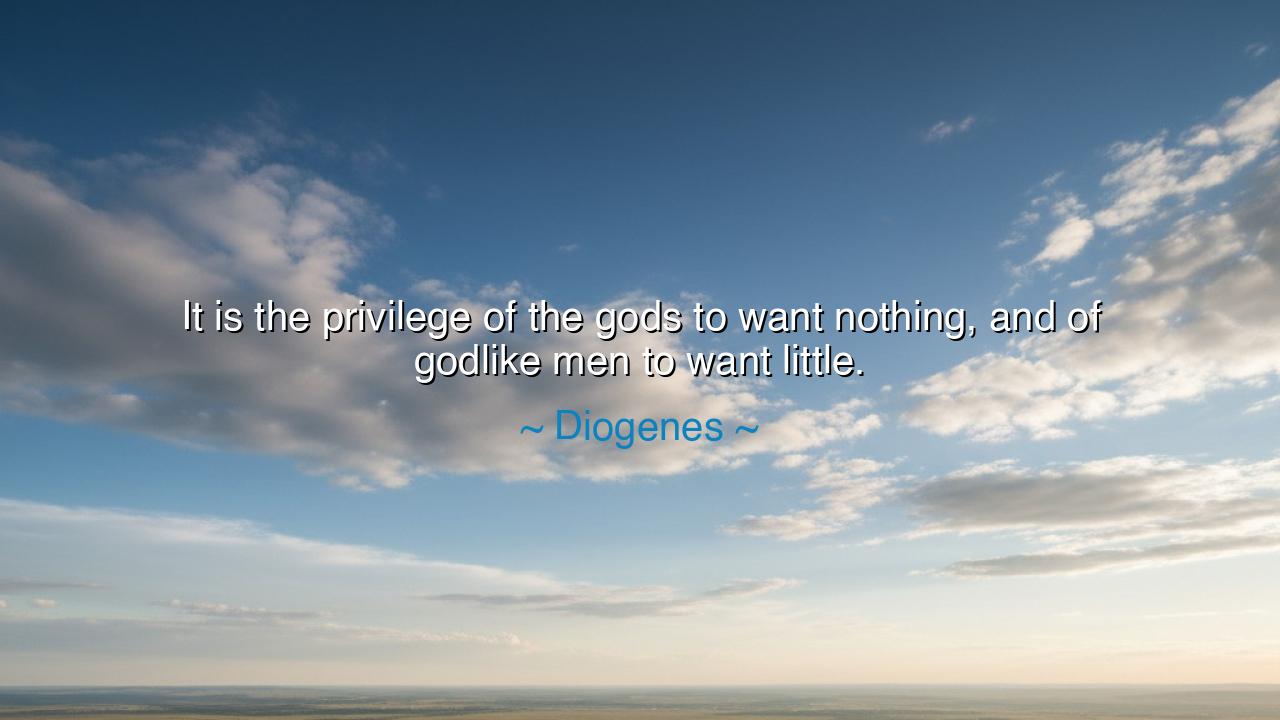
It is the privilege of the gods to want nothing, and of godlike






When Diogenes said, “It is the privilege of the gods to want nothing, and of godlike men to want little,” he offered a vision of freedom so pure that few have dared to follow it. In these words, he did not merely speak of restraint — he spoke of liberation: the release of the soul from the endless hunger of desire. The gods, in their perfection, lack nothing; they are whole, complete within themselves. But men, bound by longing, chase endlessly after comfort, wealth, power, and praise. To be godlike, Diogenes teaches, is not to possess the world, but to be free from the need to possess it at all.
Diogenes of Sinope, the great Cynic philosopher, lived in the fourth century before Christ. He rejected the trappings of civilization and sought truth in simplicity. He lived in a barrel, owned nothing but a cloak and a bowl — and even the bowl he discarded when he saw a child drinking water with his hands, realizing that he needed less than he thought. When Alexander the Great came to visit him and offered to grant him any wish, Diogenes merely replied, “Stand out of my sunlight.” In that moment, the conqueror of nations stood before a man richer than he — for Alexander needed empires to feel powerful, while Diogenes needed only the sun to feel complete.
His quote reflects this eternal truth: that freedom begins where desire ends. To want nothing is to be unshakable. The man who needs little is immune to corruption, immune to fear, and immune to the manipulation of others. The world cannot enslave the one who finds contentment in simplicity. The more one possesses, the more one fears loss; but the man who owns nothing cannot be robbed. Thus, Diogenes invites us to seek wealth not in abundance, but in sufficiency — not in having much, but in needing little.
The ancients revered this philosophy as the path to inner divinity. To the Stoics, it was the essence of virtue — to live in harmony with nature, desiring only what is necessary. To the Buddhists of the East, it was enlightenment — the stilling of craving, the quieting of the restless mind. Across every culture and age, the wise have taught that man’s greatest chains are invisible: they are his desires. The more he pursues pleasure, the more it eludes him, for desire multiplies upon fulfillment. Only by stepping outside the circle of craving does he glimpse the serenity of the gods.
History, too, is filled with examples of those who understood Diogenes’ truth. Consider Marcus Aurelius, emperor of Rome, who ruled the greatest empire on earth but lived with humility and restraint. In his Meditations, he wrote, “Very little is needed to make a happy life; it is all within yourself, in your way of thinking.” Surrounded by power, he sought peace not in palaces, but in his own soul. Like Diogenes, he understood that contentment is not found in possessions, but in perspective. When others looked outward for happiness, he looked inward — and there he found it.
Even in modern times, those who live closest to this truth are often the happiest. The farmer who wakes with the dawn and smiles at his field, the monk who sits in silence beneath a tree, the artist who creates for love, not fame — they live as godlike men, wanting little, yet possessing all that matters. Meanwhile, those who chase endlessly — the wealthy, the restless, the ambitious without peace — remain prisoners of their own longing. They are surrounded by gold but starved of joy.
The lesson, then, is both simple and profound: learn to want less. Strip life of its excess until only what is essential remains — a clear mind, a healthy body, a compassionate heart, and gratitude for the present moment. Seek joy not in accumulation but in appreciation. Before you reach for more, ask yourself if you truly need it, or if it merely distracts you from what is eternal. To want little is not to live poorly — it is to live richly, for it means you have found wealth within yourself.
So, O seeker of wisdom, remember Diogenes’ teaching: the gods are free because they want nothing; men become godlike when they desire only what life naturally gives. Let go of craving, and you will no longer be ruled by the world. Walk lightly, own little, and be content — for in that simplicity lies the grandeur of the divine. To want little is to stand beside the gods, smiling, untouched by time or loss, radiant in the sunlight of sufficiency.






AAdministratorAdministrator
Welcome, honored guests. Please leave a comment, we will respond soon